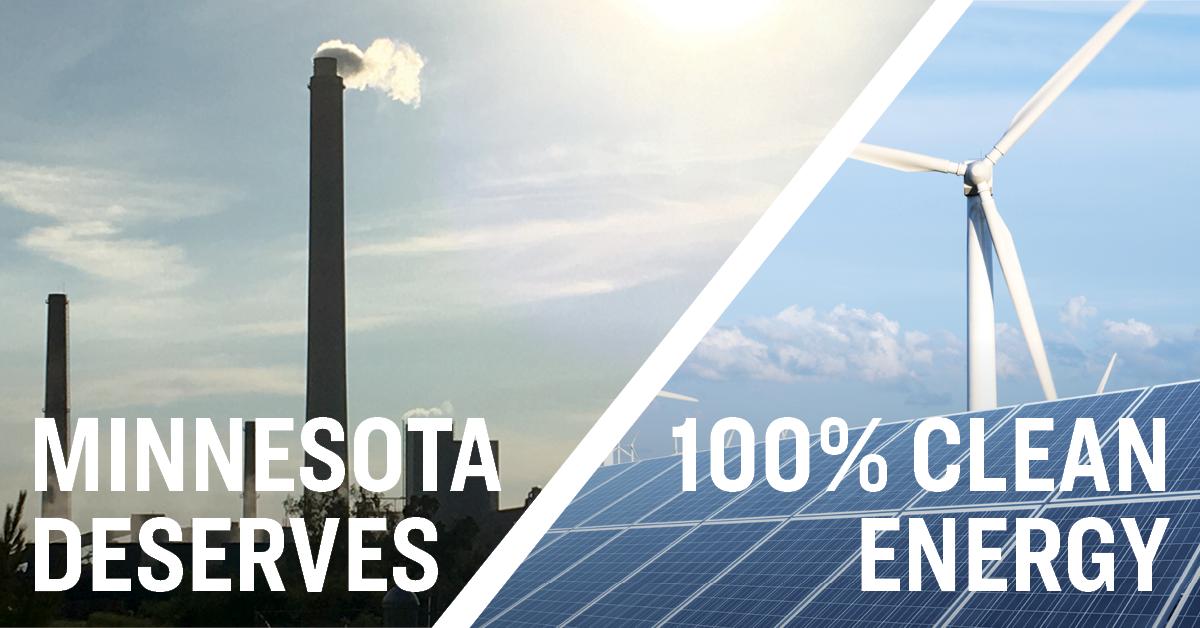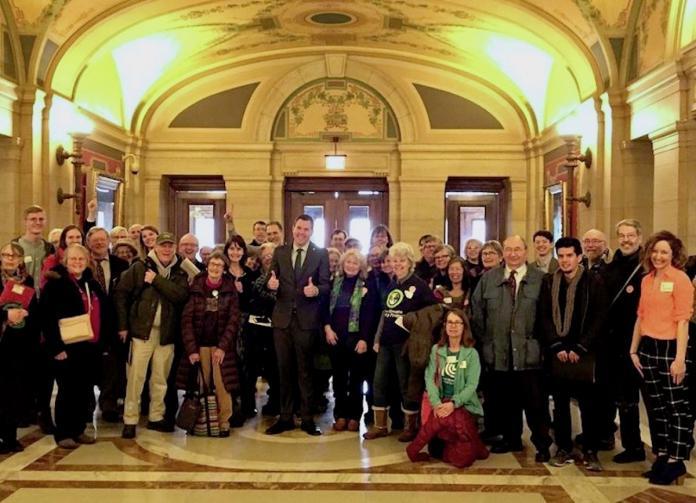
Minnesotans want bold action on climate justice. Thanks to folks across the state calling for climate solutions for decades, Minnesota has made strong progress moving away from coal to clean energy -- and the costs of wind and solar continue to decline. Utilities know this is the direction we must go: Xcel Energy committed to 100% carbon-free energy by 2050 two years ago, and Minnesota Power made the same commitment last month. These are positive steps, yet that timeline falls short of what scientists say is necessary to avoid the worst impacts of the climate crisis.
100% Clean electricity provides a foundation for us to cut emissions in other sectors. The recent report on Minnesota’s climate emissions reduction shows that we are way behind meeting our goals, which current science says is not enough. While the electricity sector is seeing the most progress thanks to the transition from coal to clean energy, we know that Xcel Energy and Minnesota Power are both proposing new fossil gas plants, and other utilities like Rochester Public Utilities are considering adding new gas. This threatens to undermine our progress. We need clean electricity to help power electric buses and cars for our transportation system and help us heat and cool our homes instead of fossil gas.
We need a just transition from fossil fuels to clean energy. As we make the transition from fossil fuels to clean energy, we have an unprecedented opportunity to reshape our energy system and ensure it benefits all Minnesotans. We will need to invest in renewable energy, energy storage, and energy efficiency, which can create good, family sustaining jobs for Minnesotans, reduce air pollution burden of fossil fuel generation, and cut costs for ratepayers. But we must prioritize investments in environmental justice communities -- Black, Indigenous and people of color (BIPOC) and low income communities -- that have been disproportionately impacted by fossil fuel pollution; and communities and workers impacted by the transition away from fossil fuel plants. And we must ensure these communities have a seat at the table in determining solutions.
Now is the time for Minnesota to commit to a just transition to 100% clean electricity. Sierra Club has joined activists all across the country in calling for 100% clean energy commitments from cities, counties, schools and states. We are founding members of the 100 Percent Campaign in MN, working towards 100% clean energy across the economy starting with 100% clean electricity. Two years ago, the Minnesota House passed a bill that would have committed Minnesota utilities to 100% clean energy by 2050, but it did not pass in the Minnesota Senate. Now, a new 100% bill has been introduced by Rep. Jamie Long and authored by a growing list of 35 representatives, with support from Governor Walz, Minnesota Department of Commerce, and Senator Nick Frentz.
The bill (House File 278 and Senate File 643) commits Minnesota utilities to 100% carbon-free energy by 2040 and sets benchmarks for carbon-free and renewable energy along the way. All Minnesota utilities would be required to meet these benchmarks, although there is an “off-ramp” in the case that a utility demonstrates that they cannot affordably and reliably meet one. While Sierra Club advocates an accelerated timeline, as proposed by President Biden in his recent Executive Order (100% by 2035) and as proposed in the Green New Deal (100% by 2030), the timeline outlined in this bill would be a bold step forward for our state and push utilities to move faster in reducing emissions.
The bill also provides the start of a framework for a just transition by directing the Public Utilities Commission to implement the standards in a way that creates family-supporting jobs, protects workers, provides workers with assistance to transition, factors environmental justice considerations in energy decisions, lowers air emissions, and keeps electricity affordable for low-income Minnesotans. It encourages utilities to locate new clean energy facilities in communities where fossil-fuel plants are closing, and requires prevailing wage for a number of projects
Bill benchmarks.
-
2025
65% carbon-free
40% renewable
2030
80% carbon-free
55% renewable
2035
90% carbon-free
2040
100% carbon-free
Carbon-free vs Renewable Energy
Carbon-free energy is defined as sources of energy that do not emit carbon dioxide. That includes both renewable energy sources like wind, solar, and hydroelectric power along with energy storage and nuclear power..
Minnesota’s renewable energy standard definition from 2007, also used in this bill, includes wind, solar, small hydro, and some biomass, including mixed municipal solid waste incineration, or trash burning.
Trash incineration is not a renewable or clean energy and should be removed from this bill. Trash incineration can have a devastating impact on the health of people near a facility. Incinerators are large emitters of toxic air pollution like heavy metals, nitrogen oxides (NOx) and Particulate Matter that are linked to a variety of health problems including asthma attacks, heart and lung disease. Communities near the plant are often environmental justice communities.
Minnesota law currently provides incentives to trash incineration by allowing utilities to count them as renewable energy in meeting the state’s renewable energy standard. This encourages more trash burning and discourages reducing and recycling waste. While incinerators would NOT count as “carbon-free” energy, they still count as “renewable” energy next to wind and solar through 2035, which is absurd.
House Bill Amended to Remove HERC as renewable resource. At the House Climate & Energy Policy & Finance Committee, Rep. Frank Hornstein offered an amendment that would remove the HERC incinerator, the largest trash incinerator in the state located in North Minneapolis, as a renewable resource. That amendment passed in committee.
Over 48 percent of the community surrounding the Hennepin Energy Recovery Center (HERC) are people of color, many living in a median household income of less than $35,000 a year. North Minneapolis residents experience the highest rates of asthma related hospitalizations in the state, more than five times the average for Minnesotans.
Community members have been calling for the closure of the HERC for years due to health impacts of this facility and the cumulative impacts of many sources of pollution located in North Minneapolis. Subjecting the highest concentration of people of color in Minnesota to a disproportionate share of pollution from multiple sources is the definition of environmental racism.
Sierra Club supported the amendment, although we also call for fixing the trash incineration loophole in our renewable energy laws by removing mixed municipal solid waste incineration from the definition of renewable energy.
We must continue to build support for 100% clean energy and other policies to support a just transition, and getting to zero emissions in the electricity sector is one key part of a state climate action plan. We will be working to build support for this and other climate justice solutions among legislators and the public. And we will continue to advocate to improve the bill by removing trash burning as a renewable resource.
How can you help? Join us!
Let's show our legislators that thousands of everyday Minnesotans want our state to be next to commit to 100% clean, equitable energy. Contact your legislator and ask them to support 100% clean electricity in Minnesota.
